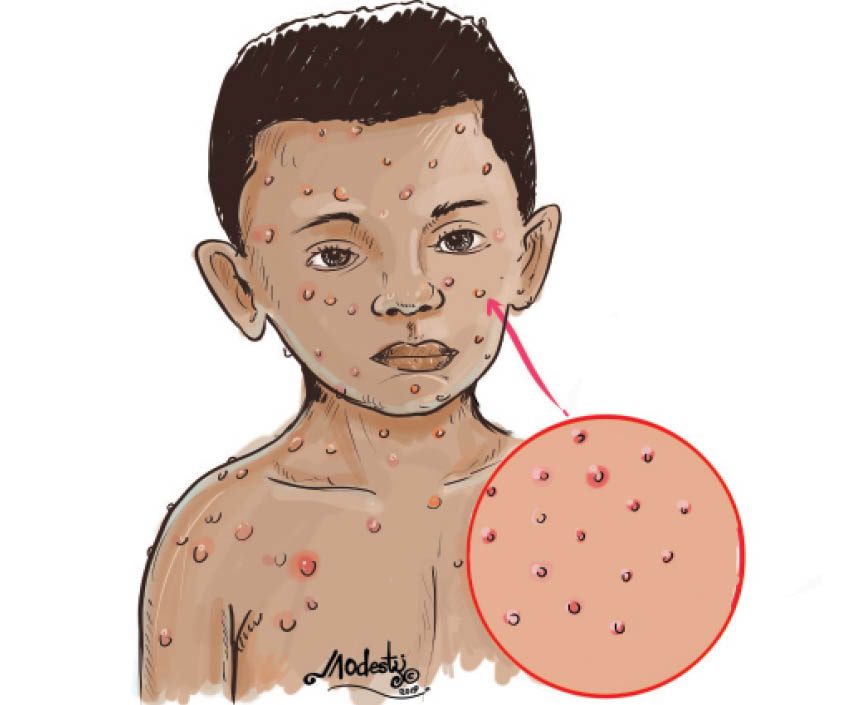Preventing measles in children
Ngozi’s son had a fever, runny nose, cough, red eyes and sore throat. Some days after the symptoms began, a rash broke out. It started as flat red spots on his face at the hairline and spread downward to his neck, trunk, arms, legs and feet. When he was taken to the University of .Abuja […]

Measles in children
Ngozi’s son had a fever, runny nose, cough, red eyes and sore throat. Some days after the symptoms began, a rash broke out. It started as flat red spots on his face at the hairline and spread downward to his neck, trunk, arms, legs and feet.
When he was taken to the University of .Abuja Teaching Hospital (UATH), Gwagwalada, it was discovered he had measles.
A paediatrician, Dr. Kuti Demilade Kehinde, says measles is one of the most deadly and contagious diseases known.
“It is caused by a virus that lives in the nose and throat mucus of an infected person. Only humans spread the measles virus, no other animal species is known to spread or harbour measles. It is a vaccine-preventable disorder, yet continues to afflict children around the world,” she said.
She said children are especially vulnerable to measles and an estimated 350 die from it every day globally despite the availability of a safe, effective and affordable vaccine.
On what causes measles in children, she said it can be transmitted from being close to someone who has it. “It travels through coughs and sneezes. You’ll also get it if you come in contact with any other nose or mouth fluids from someone who has it.”
She said measles in children usually happens in stages over a period of about 2-3 weeks, adding that for the first 10-14 days after one contacts the virus, there won’t be any signs. This is the incubation period.
“A high fever is normally the first sign of infection after the incubation period is over,” the physician said, adding: “The fever will last 4-7 days.”
She said during that time, the child might have the following symptoms:
-Runny nose
-Red eyes
-Sore throat
-Tiny white bumps in the child’s mouth (doctors call these Koplik spots)
“After these symptoms, a red bumpy rash shows up. It usually starts at the hairline and spreads to the neck, torso, limbs, feet and hands. As it spreads, your fever may spike as high as 105F or higher.
“Finally, the rash starts to fade from the top of your body downward, starting with your face,” she explained.
Dr. Kehinde said to figure out whether a child has measles; a doctor will first look closely at his/her rash. “They’ll also look for the small white Koplik spots inside your mouth. Sometimes, to confirm it, they can also do a blood test.”
She said immunization is by far the best way to prevent the spread of measles in children.
“Getting vaccinated is the best way to prevent measles. Two doses of the measles vaccines are 97 per cent effective at preventing measles infection.
“There are two vaccines available; the MMR vaccine and the MMRV vaccine. The MMR vaccine is the three-in-one vaccination that can protect a child from measles, mumps and rubella,” she said.
The physician said medicine doesn’t cure the measles virus as most drugs don’t kill viruses, adding that the best way to speed one’s recovery and prevent complications is to drink plenty of fluids and get lots of rest.
She said there’s no specific treatment for measles, but there are things one could do after coming into contact with it.
– Post-exposure vaccination: If you’ve never had a measles vaccination, you can get one up to 72 hours after being around the virus. The vaccine can lower your chances of getting it and can make your symptoms milder if you do.
– Immune serum globulin: This protein injection can boost your immune system if you’re pregnant, very young, or have a condition that makes it weak. You have to get it within six days of exposure to the virus. The injection may either prevent measles or keep your measles symptoms from being severe.
She said if the measles causes a bacterial infection, such as an ear infection or pneumonia, a doctor may prescribe an antibiotic to help treat it.
The physician said at home, you can help ease your measles symptoms with the following:
– Fever-reducing NSAIDs such as acetaminophen, ibuprofen, or naproxen. Don’t give children aspirin
– Vitamin A. Kids with low levels of vitamin A are at higher risk of measles. Boosting it can make measles symptoms less severe.
– Rest
– Plenty of fluids to hydrate yourself after fever and sweats
– A humidifier for easier breathing
– Dim lights or sunglasses to relieve eye pain caused by bright lights
